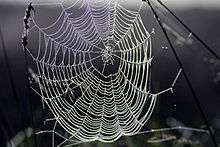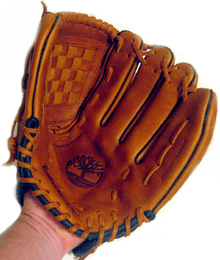web
English
Etymology
From Middle English webbe, from Old English webb, from Proto-Germanic *wabją, from Proto-Indo-European *webʰ- (“weave”).
Pronunciation
- IPA(key): /wɛb/
Audio (US) (file) - Rhymes: -ɛb
Noun
web (plural webs)
- The silken structure which a spider builds using silk secreted from the spinnerets at the caudal tip of its abdomen; a spiderweb.
 A spider's web
A spider's web- The sunlight glistened in the dew on the web.
- Any interconnected set of persons, places, or things, which when diagrammed resembles a spider's web.
- 1851, Nathaniel Hawthorne, “Main Street”, in The Snow-Image, and Other Twice-Told Tales, Boston: Ticknor, Reed,and Fields, published 1852, page 96:
- […] but the blame must rest on the sombre spirit of our forefathers, who wove their web of life with hardly a single thread of rose-color or gold, and not on me, who have a tropic-love of sunshine, and would gladly gild all the world with it, if I knew where to find so much.
- 1828, Washington Irving, “Birth, Parentage, and Education of Columbus”, in A History of the Life and Voyages of Christopher Columbus, volume I, Paris: A. and W. Galignani, page 5:
- The time of his birth, his birth-place, his parentage, are all involved in obscurity ; and such has been the perplexing ingenuity of commentators, that it is difficult to extricate the truth from the web of conjectures with which it is interwoven.
-
- Specifically, the World Wide Web (often capitalized Web).
- Let me search the web for that.
- (baseball) The part of a baseball mitt between the forefinger and thumb, the webbing.
 A baseball glove, with a web between the thumb and forefinger
A baseball glove, with a web between the thumb and forefinger- He caught the ball in the web.
- A latticed or woven structure.
- The gazebo's roof was a web made of thin strips of wood.
- 1866, George Bancroft, “New Netherland”, in History of the United States of America, from the Discovery of the American Continent, volume II, 21st edition, Boston: Little, Brown, and Company, page 281:
- The colonists were forbidden to manufacture any woollen, or linen, or cotton fabrics ; not a web might be woven, not a shuttle thrown, on penalty of exile.
- (usually with "spin", "weave", or similar verbs) A tall tale with more complexity than a myth or legend.
- Careful—she knows how to spin a good web, but don't lean too hard on what she says.
- A plot or scheme.
- The interconnection between flanges in structural members, increasing the effective lever arm and so the load capacity of the member.
- (rail transport) The thinner vertical section of a railway rail between the top (head) and bottom (foot) of the rail.
 Profile of flat-bottomed and bullhead railway rail showing the web
Profile of flat-bottomed and bullhead railway rail showing the web - A fold of tissue connecting the toes of certain birds, or of other animals.
- The series of barbs implanted on each side of the shaft of a feather, whether stiff and united together by barbules, as in ordinary feathers, or soft and separate, as in downy feathers.
- (manufacturing) A continuous strip of material carried by rollers during processing.
- (lithography) A long sheet of paper which is fed from a roll into a printing press, as opposed to individual sheets of paper.
- (dated) A band of webbing used to regulate the extension of the hood of a carriage.
- A thin metal sheet, plate, or strip, as of lead.
- 1600, Edward Fairfax, transl., Godfrey of Bulloigne: Or, The Recouerie of Ierusalem, London: Ar. Hatfield, translation of La Gerusalemme liberata by Torquato Tasso, book X, stanza 26, page 184:
- […] And there with ſtately pompe by heapes they wend, / And Chriſtians ſlaine rolle vp in webs of lead […]
- 1600, Edward Fairfax, transl., Godfrey of Bulloigne: Or, The Recouerie of Ierusalem, London: Ar. Hatfield, translation of La Gerusalemme liberata by Torquato Tasso, book II, stanza 93, page 38:
- Argant a ſword, whereof the web was ſteele, / Pommell, rich ſtone ; hilts, gold, approu’d by tuch, / With rareſt workmanſhip all forged weele, / The curious art exceld the ſubſtance much.
-
- (US, radio, television) A major broadcasting network.
- 1950, Billboard (volume 62, number 43, page 9)
- […] the first big move toward a contract for television performers was made Friday (20) when the webs agreed to pay them according to the length of the show. […] Altho the major TV webs — NBC and CBS — may fall in line soon, an agreement may possibly be held up by the opposition of DuMont […]
- 1950, Billboard (volume 62, number 43, page 9)
Derived terms
Derived terms of "web"
- webathon
- webbed
- webber
- webbing
- webbook
- webby
- webcam
- webcammer
- webcap
- webcast
- webcasting
- webchat
- webcomic
- webconference
- WebDAV
- webform
- webhead
- webify
- webinar
- webisode
- webize
- webless
- weblication
- weblike
- weblink
- webliography
- weblish
- Weblish
- weblog
- weblogger
- weblogging
- webmag
- webmail
- webmaster
- webmeister
- webmistress
- webocracy
- webography
- webpage
- webphone
- webphone
- webpreneur
- webring
- webroot
- webserver
- webshop
- website
- webspinner
- webster
- websurfer
- webtoon
- webtop
- webumentary
- webutation
- webwinkel
- webwork
- webworm
- webzine
Synonyms
- (fanciful tale) yarn
Translations
spiderweb — see spiderweb
any interconnected set of persons, places, or things
the World Wide Web (also spelled Web)
|
|
the part of a baseball mitt between the forefinger and thumb, the webbing
a latticed or woven structure
the thinner vertical section of a railway rail between the top and bottom of the rail
a fold of tissue connecting the toes of certain birds
a continuous strip of material carried by rollers during processing
- The translations below need to be checked and inserted above into the appropriate translation tables, removing any numbers. Numbers do not necessarily match those in definitions. See instructions at Wiktionary:Entry layout#Translations.
Verb
web (third-person singular simple present webs, present participle webbing, simple past and past participle webbed)
- (intransitive) To construct or form a web.
- (transitive) To cover with a web or network.
- 1853 June 21, R. C. Stone, “A New Insect”, in Simon Brown, editor, The New England Farmer, volume V, Boston: Raynolds & Nourse, page 362:
- The canker worm has no shelter upon the tree, but lies out upon the leaf or branch ; this forms itself a house by webbing the corner of a leaf, into which it retreats on the first appearance of danger […]
-
- (transitive) To ensnare or entangle.
- (transitive) To provide with a web.
- (transitive, obsolete) To weave.
- 1511–12, “An Act agaynst deceyptfull making of Wollen Cloth”, in The Statures of the Realm, volume III, London: Dawsons of Pall Mall, published 1963, page 28:
- Item that the Wever whiche shall have the wevyng of eny wollen yerne to be webbed into cloth shall weve werk […]
-
Translations
- The translations below need to be checked and inserted above into the appropriate translation tables, removing any numbers. Numbers do not necessarily match those in definitions. See instructions at Wiktionary:Entry layout#Translations.
Translations to be checked
|
Catalan
Further reading
- “web” in Diccionari de la llengua catalana, segona edició, Institut d’Estudis Catalans.
Dutch
Etymology
From Middle Dutch webbe, from Old Dutch *web, from Proto-Germanic *wabją, ultimately from Proto-Indo-European *webʰ- (“weave”).
Pronunciation
- IPA(key): /ʋɛp/
Audio (file) - Hyphenation: web
- Rhymes: -ɛp
Derived terms
Hungarian
Pronunciation
- IPA(key): [ˈvɛb]
Declension
| Inflection (stem in -e-, front unrounded harmony) | ||
|---|---|---|
| singular | plural | |
| nominative | web | webek |
| accusative | webet | webeket |
| dative | webnek | webeknek |
| instrumental | webbel | webekkel |
| causal-final | webért | webekért |
| translative | webbé | webekké |
| terminative | webig | webekig |
| essive-formal | webként | webekként |
| essive-modal | — | — |
| inessive | webben | webekben |
| superessive | weben | webeken |
| adessive | webnél | webeknél |
| illative | webbe | webekbe |
| sublative | webre | webekre |
| allative | webhez | webekhez |
| elative | webből | webekből |
| delative | webről | webekről |
| ablative | webtől | webektől |
| Possessive forms of web | ||
|---|---|---|
| possessor | single possession | multiple possessions |
| 1st person sing. | webem | webjeim |
| 2nd person sing. | webed | webjeid |
| 3rd person sing. | webje | webjei |
| 1st person plural | webünk | webjeink |
| 2nd person plural | webetek | webjeitek |
| 3rd person plural | webjük | webjeik |
Derived terms
(Compound words):
- webalkalmazás
- webáruház
- webcím
- webergonómia
- webkamera
- weblap
- weboldal
- webszerver
References
- Tótfalusi, István. Idegenszó-tár: Idegen szavak értelmező és etimológiai szótára (A Storehouse of Foreign Words: an explanatory and etymological dictionary of foreign words’). Budapest: Tinta Könyvkiadó, 2005. →ISBN
Japanese
Alternative forms
- WEB
Noun
web (katakana ウェブ, rōmaji webu)
- the Internet
- web上で公開された
- webu-jō de kōkai sareta
- made public online
- web番組
- webu-bangumi
- online program
- web上で公開された
Usage notes
- Capitalization may follow English conventions.
Portuguese
Spanish
Pronunciation
- IPA(key): /ˈweb/, [ˈweβ]; IPA(key): /ˈɡweb/, [ˈɡweβ]
Derived terms
References
- “web” in Diccionario de la lengua española, Vigésima tercera edición, Real Academia Española, 2014.
West Frisian
Etymology
Derived terms
Further reading
- “web”, in Wurdboek fan de Fryske taal (in Dutch), 2011
This article is issued from
Wiktionary.
The text is licensed under Creative
Commons - Attribution - Sharealike.
Additional terms may apply for the media files.